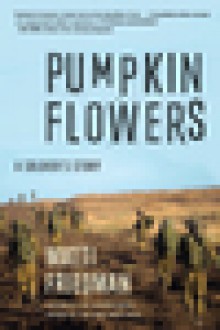
This book is the story of an unknown part of the Israeli/Lebanese conflict. Young men were sent to a remote place called Pumpkin Hill, in order to protect the border between Lebanon and Israel; the conflict cost many lives on both sides over several decades. It also possibly changed the course of history in the Middle East. The book is written in such a way, with an almost casual relating of events, as a reporter would relate them, so that the import of the message is sometimes lost in the fog of the war, but the dedication, loyalty and the sacrifices of the Israeli soldiers is not. In Israel, the injured soldiers are called flowers and the dead are referred to as oleander. The twelve outposts overlooking and securing the Israeli/Lebanese border also had colorful names. The hill was used as a media tool by Hezbollah. In 1994, they staged a surprise attack on this tiny outpost and filmed it in such a way that Hezbollah could use it for propaganda purposes to recruit soldiers into their ranks. Although the Israelis were afraid, so too were the attackers, who were not filmed running away. The media was complicit in creating their story. It turns out that the media may be the best weapon anyone can use. The Lebanese conflict may have spawned the suicide bombers and rise of Hezbollah. The Israeli show of force and presence on the border may have inspired further rebellion. The reader will have to judge for themselves exactly what the catalysts are for the expanding Middle East conflict. For sure, the events on that hill inspired the Four Mother’s Movement which finally brought the occupation to an end. With the election of President Barak, Israel pulled out of Lebanon, in 2000. What happened on Pumpkin Hill, beginning in 1994 and continuing until 2000, is not recorded for public consumption, but the circumstances surrounding the holding of the hill made the Israelis rethink the efficacy of the Lebanese military operation. Matti Friedman participated in the protection of that hill. These are his thoughts and memories coupled with the testimony of others who were witnesses and willing /or unwilling participants. The hill remained with him, even after the outposts were destroyed. In 2002, he made a trip into Lebanon, concealing his Israeli identity, and revisited the places there that were visible from his watch post on Pumpkin Hill, the places they joked about someday visiting as tourists when peace would come. Now, a decade and a half later, peace has not come as hoped, but he has recorded the story of Pumpkin Hill and its effect on the soldiers who held it, on the Israelis and the Lebanese, the Christians and the Muslims, in essence, on all involved. He has recorded his impression of his clandestine trip back to Lebanon. Was the effort to hold that hill and that border worthwhile? Is it indeed necessary for Israel to take all of the defensive actions it has taken and will continue to take, perhaps, in order to survive? When the Israelis evacuated their outposts, the South Lebanese Army faded into the background or joined forces with their former enemies; they had no other choice. The world watched the rise of Hezbollah and the suicide attacks on Israel. Will this simply be the way of life in Israel forever? Will they be able to simply go about their daily lives as if the attacks are just a normal part of their lives, as if life is simply portable, one day here, one day not here. If they do, it will not be apathy, but rather it will be a determination to survive, an indication of their strength and fortitude in the face of constant turmoil, living in a place that wants only to reject them and erase their country from the pages of history in much the same way Pumpkin Hill has been wiped from the pages of Israeli history. I had mixed feelings reading the book. At first I was horrified, thinking that perhaps Israel had instigated the Middle Eastern conflict by their reactions, criticized in all quarters at all times. After all, both sides suffered the loss of life. One side treasured and tried to protect them, though, while the other side sacrificed them in their cause. As I read, I thought, no, this conflict continues because the enemies of Israel refuse to accept its existence as a Jewish state, to accept its historic place there, to acknowledge its holy sites. Whatever the reason for the conflict initially, its perpetuation lies in those facts. Israel usually retaliates to protect itself; the survival of the country is and has always been the prime mover and motive of its leaders. As a Jew, I hope it continues to be. Long live Israel. I pray for a short lived existence of the sponsors of its enemies. I am not too hopeful, but, I too, am determined that it remain a viable democracy in the cradle of civilization. It is up to history to judge the events in the Middle East. Hindsight seems to always be the clearest perception of events. At the end, the first words of the song “What’s It All About Alfie?” kept playing in my head. “What’s it all about Alfie? Is it just for the moment we live? I gave the book five stars because it is an honest appraisal of both sides of the issue, the loss of future men and women and the pain left behind by their absence. It humanizes the soldiers, their families and the country, and grounds them all in reality. They were, after all, just boys being told what to do, but they were expected to act like men! They were the country’s human treasure. They persist and prevail still.


 Log in with Facebook
Log in with Facebook 








